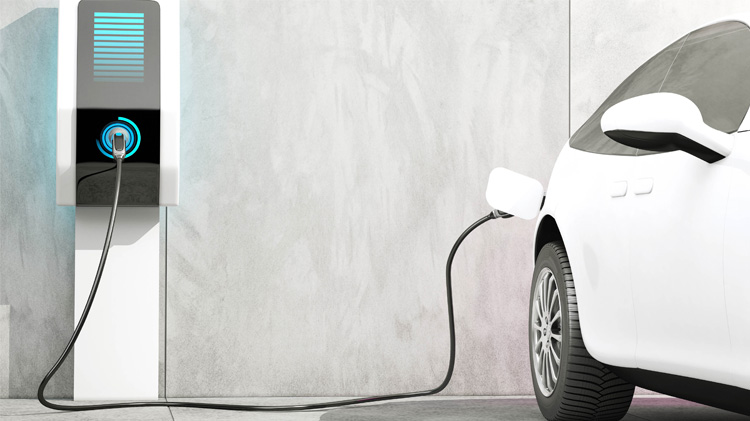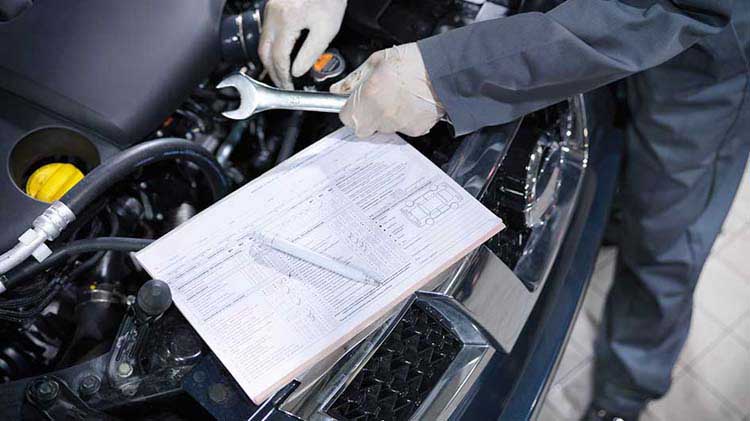Buying an electric car
As you get ready to buy an electric car, we have some questions you can ask along with information about charging.
There are certainly advantages to plug-in electric cars, but there is at least one significant reason to give pause: Their purchase cost is more than their traditional gas-powered cousins. Is that initial expense worth it in the long run? Consider these electric car questions and answers before buying an electric vehicle (EV).
What are the different types of electric vehicles?
EVs are electric vehicles that gain some or all of their power from electricity. There are four basic types:
- All-electric vehicles (EV or BEV), which rely on a large battery and do not use gasoline at all.
- Plug-in hybrid electric vehicles (PHEV), which can be powered by both electricity and gas.
- Fuel-cell electric vehicles (FCEV), which utilize a system of cells that use hydrogen gas and oxygen from the air to produce electricity.
- Hybrid electric vehicle (HEV), which utilize a gas engine and a motor that uses energy stored in batteries.
What to consider when buying electric vehicles
Electric vehicles, including hybrid and plug-in, have seen their popularity increase with more auto manufacturers expanding their offerings. The differences between electric and traditional gas are primarily in cost of ownership and the overall ownership experience. And the differences are significant enough that when it comes to purchasing an EV, you’ll need to ask different questions.
Buying a new electric vehicle
How you drive and your lifestyle needs will be key questions as you start looking at buying a new EV. In addition to knowing how many miles the vehicle you are looking to buy runs on a single charge, here are a few areas to consider.
Passenger and cargo space
- Will it meet your needs when it comes to carrying your friends, family, groceries and other cargo?
- Will you need child safety seats and will the back seat have enough space to easily allow installation?
- Do you play golf or another sport that will require a car with larger cargo space to fit bigger equipment bags?
Charging an EV
- How will you charge your EV?
- Will you need to install a home charging station?
- Are there public EV charging stations at your work or regular grocery store?
- Do you know what level (1, 2 or 3) the charging station is and how long it will take to charge your EV?
- Will you need to install a home charging station?
- Is an EV with a faster charging capability worth any extra costs?
- Do you live in a cold-weather state where temperature could be a factor in how many miles the car can operate on a charge?
- Will you need a gas-powered vehicle as a backup for such things as long road trips?
- Would a hybrid or plug-in hybrid be more practical for you?
While gas stations are plentiful to refuel gas engine-powered cars, there is still a challenge in finding public charging stations, especially when you travel.
Electric car maintenance
While all-electric vehicles don’t require regular oil changes like cars and hybrids with gas engines, EVs will still need regular vehicle maintenance items such as tire rotations and brake repairs. You’ll also want to know about the service life of the battery pack for the model of EV you are looking at and how much it costs to replace it. Currently, the service life of a battery pack ranges between 8-10 years in areas of extreme weather and even longer for mild climates.
Purchasing costs
- How long you will own the EV, and will you buy or lease?
- Are there any government rebates or tax credits offered to offset the increased price of an EV?
Federal tax credits for new EV and plug-in hybrids typically range from $1,000 to $7,500, depending on the vehicle model and battery size. Some utility companies provide special rates, and many states offer their own incentives.
Buying a used electric vehicle
Buying a used EV may make more sense for your budget. In addition to asking questions about passenger and cargo space, charging and maintenance costs, you will want to ask:
- How much battery life is remaining?
- Does this used battery have the same range it did as when it was new?
- How much will it cost to replace the battery pack when it’s reached the end of its service life?
Pros and cons of electric cars
Much like with any car purchase, there are always advantages and disadvantages. As you weigh the decision, here is a quick rundown of some of the pros and cons:
Pros:
- Savings on gas and maintenance costs
- Possible tax credits or rebates
- Smaller impact on the environment
- Higher performance, more responsive acceleration
- Shorter commutes – EVs may be allowed to use carpool lane
Cons:
- Higher upfront costs
- Limited range
- Long charge times
- Possibly higher insurance costs
- Higher utility costs
How long do electric car batteries last?
Most of today's electric vehicles can travel over 200 miles on a full charge when driven at lower speeds (city driving, for example). Highway driving consumes battery reserve faster and may result in a range that is significantly less than what is advertised. And there are still some models that prioritize performance over range. Extended-range electric vehicles (EREVs) can increase mileage even more, and a plug-in hybrid, with a gas tank for backup, increases range, too. Remember: Adding an engine means adding gas costs and engine maintenance, including oil changes, which regular EVs don’t require.
Where do you charge an electric car?
There are a few options for charging an electric vehicle at home, but the up-front cost can range from $1,000 to $2,500 or more, depending on what features the electric vehicle charging station is equipped with. While you can get by with a Level 1 charging station, most homeowners choose to invest in a Level 2 station. Some EV owners also invest in solar panel charging, for environmental and monetary reasons.
Electric car charging stations
- Level 1 – Typically, these chargers are included with the car and use 120-volt outlets. They can take up to 24 hours to charge a car fully.
- Level 2 – Homeowners usually select this type of charging station. These require a 240-volt outlet and can be portable or mounted.
- Level 3 – This is the commercial type you see in public.
How much does it cost to charge an electric car at home?
The average EV requires about 35 kilowatt hours (kWh) to travel 100 miles. While costs consistently fluctuate, let's assume the national average of 15¢/kWh, that's $5.25 per 100 miles — $788 annually for the average 15,000 mile-per-year driver, mainly charging at home. Compare that to $2,082 a year for a gas-powered vehicle, assuming 25 mpg at $3.47/gallon. Plug in your local energy costs to personalize those numbers.
Finding an electric car charging station?
With the recent influx of electric vehicles on the market, it may seem that there won’t be enough charging stations to go around. As of November, 2022, there are currently more than 56,000 public charging stations across the United States, though availability varies widely depending on where you live. However, an infrastructure bill signed in late 2021 aims to make charging stations more accessible throughout the country. The bill includes $7.5 billion dedicated to building a nationwide network of electric vehicle charging stations. Visit afdc.energy.gov to check the availability in your area.
Do electric cars save energy?
According to research published by the EPA, total greenhouse gas emissions produced over the lifetime of the vehicle, including manufacturing, are less than the emissions produced over the lifetime of a gasoline car. While it’s true that powering EVs with electricity may create some emissions and manufacturing an EV’s battery can create more carbon pollution than creating a gasoline car, these emissions are offset by the lifetime emissions saved by driving an EV. These environmental savings can go even further if the electric battery is recycled.
How do you plan to use your electric car?
Consider your personal mix of highway and city driving and what you would like to use the vehicle for. The combination of charging availability, speed of charging and actual miles driven should be cross referenced to what the electric vehicle manufacturer specifies. All of these considerations can help you decide if an electric vehicle is the right fit for you.
Electric car insurance
If you purchase an electric vehicle, a State Farm® agent would be happy to provide a quote and discuss any questions you may have about insuring and electric vehicle.




